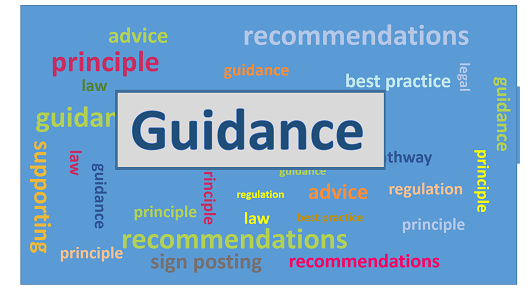Safeguarding News March 2025
Dear Colleague
Welcome to the April edition of SAFEcic'sSafeguarding Newsletter, bringing you a comprehensive roundup of the latest safeguarding news stories and headlines from March 2025.
With nearly 200 hours of sunshine throughout last month here in the UK, it certainly felt like spring had sprung. That sense of seasonal renewal and the accompanying positive outlook was somewhat short-lived, with the prospect of the negative impact on economies around the globe being created by decisions across the pond in the White House. With everybody looking to their bottom lines and becoming increasingly conscious of expenditure, the good news is that SAFEcic's products and services continue to provide exceptional value. There are also attractive volume discounts for those wishing to plan ahead for the entire financial year.
Catch it again:
BBC Radio 4 The Will Power Detectives
Since its first airing, hundreds of listeners contacted the BBC with their own stories about power of attorney and the way it can be abused. This series reveals how a partner at an Essex based law firm – Ron Hiller – was taking over the finances of vulnerable clients, clearing and selling their homes and leaving them without access to information about where their money had gone. There is also a new update programme available.
SAFEcic Products and Services
Safeguarding Supervision
Effective safeguarding Supervision provides support, coaching and training for staff supervision and promotes the interests of  children and adults at risk. Supervision will foster a culture of mutual support, teamwork and continuous improvement, which encourages reflection and confidential discussion of sensitive issues.
children and adults at risk. Supervision will foster a culture of mutual support, teamwork and continuous improvement, which encourages reflection and confidential discussion of sensitive issues.
To find out more, email This email address is being protected from spambots. You need JavaScript enabled to view it.
Safeguarding AuditsSAFEcic offers both Desktop and On-site Audits that include comprehensive policy reviews, recruitment and record keeping processes, personnel interviews and safeguarding walks to audit premises, activities and services.
The expert SAFEcic team has been providing safeguarding audits and pre-inspection audit services for over 25 years. We offer them for a wide range of organisations including charities, businesses, faith groups, leisure, health and education. Find out more.
SAFEcic's Rapid Review Service is a proven, cost-effective and efficient way for busy managers, directors and trustees across many sectors (including Ofsted, CQC and Charity Commission regulated organisations) to gain external, expert insight and support to help their organisation attain the highest level of safeguarding culture, policy, procedures and practice.
A Rapid Review takes just two hours of management time via Zoom or Teams and the price includes preparation of a high-level assessment report and an action plan to efficiently and cost effectively address any identified issues. Find out more or book a Rapid Review
SAFEcic provides DBS Check applications and administration.
Effective Safeguarding Record Keeping
This new two-hour live Zoom training is designed to highlight key legislation and statutory guidance related to record keeping. The session will define the meanings of confidentiality, consent, information sharing, privacy, mental capacity, record storage and retention periods, data protection and UK GDPR in relation to safeguarding record keeping.
All delegates must already have a current Leading on Safeguarding training certificate in place before attending this course.
For further information click here
Professional Boundaries Training
The Professional Boundaries Training course is focused on the professional boundaries within a manager's own role and responsibilities. The course is designed for managers of all those who work or volunteer directly, with children, young people, adults at risk and/or their families or carers. All delegates must already have current Safeguarding training certificates in place, as relevant to their role, prior to attending this live 2 hour course via Zoom.
Delegates will gain an understanding of the concept of the duty of care and the code of conduct required when working with children, young people and adults who may be at risk. We look at issues which challenge professional boundaries in the organisation and debate possible scenarios and the actions that need to be taken when there is a concern that professional boundaries have been breached.
The course includes a digital resource pack and certificate of attendance or each delegate, valid for three years
For further information click here
Single Central Record
Single Central Record (SCR) live 2 hours Zoom course with one of our experts and designed for education colleagues. This thorough, detailed and fully up to date course is essential for all those involved with managing and reviewing the SCR in regulated educational settings, in line with Ofsted expectations.
For further information click here
Training Schedule
Our latest training schedule is listed below and feel free to share this email with your colleagues and they too can join our newsletter database.
To sign up simply click here.
SAFEcic Blended Learning Training Calendar
Professional Boundaries Training live online Zoom training
View available dates
Effective Safeguarding Record Keeping live online Zoom training
View available dates
Single Central Record (SCR). Managing, Reviewing and Updating live online Zoom training
View available dates
Leading on Child and Adult Safeguarding online course plus live online Zoom training
View available dates
Standard Child and Adult Safeguarding online course plus live online Zoom training
View available dates
Safeguarding: Trustees’ legal responsibilities online course plus live Zoom training
View available dates
Safer Recruitment Training online course plus live Zoom training
View available dates
Managing and Leading on International Safeguarding online course plus live online Zoom training
View available dates
SAFEcic's free hub resources by setting are available through the SAFEcic.co.uk main menu. Alternately you can bookmark the links below:
Education | Dental | Charities | GP & Primary Medical Services | Fath Groups | Entertainment & Leisure | Working Overseas |
Best Practice Guidance

New Guidance: Best Practices for Managing Images and Videos on School Websites
Source: published on this site Monday 24 March 2025
Ensuring a secure and professional online presence is essential for schools and colleges, especially when managing images and videos. The UK Safer Internet Centre (UKSIC), in collaboration with the Professionals Online Safety Helpline (POSH) and the UKCIS Early Warning Working Group, has released Access Guidance to help educational institutions protect students and staff from potential misuse of digital media.
Key guidelines for schools and colleges
The guidance breaks down several key areas. Schools should regularly audit their online content, ensuring that student images are used appropriately and in line with data protection policies. A ‘Names-No-Images / Images-No-Names’ policy can reduce risks, while restricting public access by using password-protected platforms adds an extra layer of security. Removing metadata from images, using lower resolution files, and applying strict privacy settings on social media accounts further helps protect students from potential misuse.
Staff should be trained in secure image management, and clear guidelines should be established for the use of both student and staff images. Schools should engage with parents and carers to communicate safeguarding policies and set expectations for responsible image sharing. Finally, maintaining effective policies and collaborating with online safety organisations will ensure that schools remain up to date with best practices in digital safety.
Adopting best practices
By adopting these best practices, schools and colleges can continue celebrating student achievements whilst ensuring their online presence remains safe, professional, and compliant with data protection regulations. Maintaining a proactive approach to managing images and videos helps create a secure online environment for students, staff, and the wider school community.
Inquiry, Review, Audit Reports, Responses and Consultations

1. 2025 Appropriate filtering and monitoring definitions published for public consultation
The UK Safer Internet Centre (UKSIC) has published a draft of its ‘appropriate’ filtering and monitoring definitions for 2025 for public consultation. The definitions help both schools and providers understand what is considered ‘appropriate’ and comments are invited regarding this years proposed revisions.
Alongside the DfE’s introduction of statutory guidance and Prevent Duty obligations, UKSIC first published its filtering and monitoring definitions in 2016 to help both schools and providers understand what should be considered as ‘appropriate’. These are the final proposed revisions alongside a version that tracks the changes compared to 2024 with a summary of the substantive changes, both for Filtering and Monitoring.
2. Consultation on draft Guidance: A safer life online for women and girls
Ofcom is consulting on draft guidance, which sets out nine areas where technology firms should do more to improve women and girls’ online safety by taking responsibility, designing their services to prevent harm and supporting their users. The Online Safety Act 2023 makes platforms – including social media, gaming services, dating apps, discussion forums and search services – legally responsible for protecting people in the UK from illegal content and content harmful to children, including harms that disproportionately affect women and girls.
Ofcom has already published final Codes and risk assessment guidance on how we expect platforms to tackle illegal content, and we’ll shortly publish our final Codes and guidance on the protection of children. Once these duties come into force, Ofcom’s role will be to hold tech companies to account, using the full force of our enforcement powers where necessary. Ofcom is also required to produce guidance setting out how providers can take action against harmful content and activity that disproportionately affects women and girls, in recognition of the unique risks they face. The draft Guidance identifies a total of nine areas where technology firms should do more to improve women and girls’ online safety by taking responsibility, designing their services to prevent harm and supporting their users. Submit the consultation-response-form (ODT, 98.85 KB) form by 5pm on 23 May 2025.
If you have been affected by these harms, you can find support services at these websites: Domestic Abuse Commissioner and Victim and Witness Information . If you’re worried someone might share your intimate images online or it has already happened to you, visit the StopNCII and the Revenge Porn Helpline websites
Regulatory Bodies

The Committee on Standards in Public Life (CSPL)
has published its report ‘Early Warning Signs in Public Sector Bodies’ highlighting how public sector bodies fail to grasp the significance of emerging red flags and fail to act on these early warning signals. The report calls for public sector bodies to put in place the processes needed to recognise these early warning signs and to facilitate a culture where speaking up about concerns and learning from mistakes are seen as a personal duty and valued by everyone in the organisation.
Charity
Charity regulator warns about fraudulent letters sent on its behalf
The messages typically request action to be taken such as removing a trustee or chief executive from their position, releasing funds as part of a grant or supplying documents such as a passport or utility bill. They may be signed as coming from ‘the Commission,’ Chief Executive Officer and/or its Directors.
It’s not always easy to tell if correspondence is real or fake, however please note the Commission will only send you a letter just by post only if it does not have your current email address and encourages you to check and update your details
The Commission:
- rarely address letters generically, for example ‘to whom it may concern’
- does not write letters or emails of certification on behalf of UK charities regarding tax exemption or any other matters
- does not issue requests to authenticate an account online by supplying personal identity documents
- will not ask you to provide banking information
In the rare circumstance where the Commission might send you a letter by post, it will:
- be franked – not stamped
- normally have a case number or reference on it
- be unlikely to be marked as ‘Strictly Private and Confidential’
- comes from the Charity Commission of ‘England and Wales’, not the ‘UK’ or ‘England’
It is unlikely that any serious allegations against individuals would be detailed in a letter, or that name individuals would be named before there was clear evidence of wrongdoing. Matters to do with casework or investigation would normally come from a caseworker or a team at the Commission.
If you are in any doubt, contact the Commission to check.
Ofcom and all Online Safety

1. Almost half of 8 to 17-year-olds have been scammed online - UK Safer Internet Centre
Source: UK Safer Internet Centre (UKSIC) published on this website Wednesday 5 March 2025
For Safer Internet Day 2025 the UKSIC conducted some brand new research into young people's experiences of scams online. This research found that:
- 79% of young people come across online scams at least monthly, with 20%, including children as young as 8, seeing scams online every day.
- Almost a fifth of 8 to 17-year-olds (18%) know someone their age who has lost money to an online scam.
- Over a quarter (26%) of young people who've been scammed online blame themselves.
- 74% of 8 to 17-year-olds want to learn more about how to spot scams online.
2. Surge in use of ‘game-changing’ Report Remove service
Child protection analysts have seen a significant rise in reports from children accessing the world-leading Report Remove service run by the Internet Watch Foundation (IWF) and the NSPCC’s Childline service.
Hailed by one parent as a ‘game-changer’, the tool allows anyone under 18 in the UK to anonymously report sexual images and videos of themselves on the internet. The surge in use also comes at a time when the ‘ruthless’ sexual extortion of children shows no sign of abating.
The new data from IWF show that 1,142 reports were submitted to Report Remove and assessed by analysts in 2024, a 44% increase on the year before. Of these, the IWF – the UK’s hotline dedicated to finding and removing child sexual abuse imagery online – actioned 642 reports (56%) that contained criminal child sexual abuse content. This is also a rise when compared with 508 reports from 2023 (26%).
Reports ‘actioned’ by the IWF are confirmed as containing images and/or videos of child sexual abuse according to UK law. Children can report both webpages that contain their sexual image or the individual images and videos themselves via the Report Remove service. IWF analysts can then take steps to block and take down any criminal webpages and imagery.
The IWF reviews all submissions to Report Remove and works swiftly to ensure sexual images of children are removed. Children using this tool can also talk to a Childline counsellor if they want any extra support, or access support on the Childline website. Adults can contact the NSPCC Helpline on 0808 800 5000 or via This email address is being protected from spambots. You need JavaScript enabled to view it. and Childline is always confidentially available for children and young people on 0800 1111 or at childline.org.uk.
Children who are being threatened online are given the following advice:
1. Report what has happened. You can do this by contacting your local police on 101 or making a report to the National Crime Agency’s CEOP Safety Centre, where a Child Protection Advisor will make sure you get the help you need. Always call 999 if you are in immediate danger.
2. If you’re not ready to make a report to the police or feel worried about what might happen, you can speak to understanding and non-judgemental people at Childline. You don’t need to give your name or details.
3. If you have copies of the images, videos, or links to the website where images or videos may be shown, you can use an online tool called Report Remove. Report Remove is here to help young people, under 18, in the UK to confidentially report sexual images and videos of themselves and the IWF will then try to have them removed from the internet. Once you’ve used Report Remove, you will also be able to talk to a trained Childline counsellor, who will have provided support to other children and young people in the same situation.
4. Stop all contact with anyone who is trying to blackmail or threaten. Do not share any more images or videos or pay any money of any sort. If you have been communicating on an app, there should be in-built tools to block and report the user.
5. Finally, remember - this is not your fault. The person trying to blackmail or sexually extort you is the one who is in the wrong. Lots of other young people have been in a similar situation. If you're feeling upset and need to talk to someone, you can get in touch with Childline.
3. Enforcement Programme to monitor compliance with the illegal content risk assessment duties and record keeping duties
User-to-user and search services must carry out an illegal content risk assessment. This is a legal obligation and requires service providers to assess the risks associated with priority offences and other illegal content on their services. Services must also make and keep a written record, in an easily understandable form, of all aspects of every illegal content risk assessment, including details about how the assessment was carried out and its findings.
On 16 December 2024, Ofcom published Risk Assessment Guidance and Risk Profiles to help service providers comply with the illegal content risk assessment duties. This guidance sets out a four-step risk assessment process, to help services comply with the illegal content risk assessment duties. It also published Record Keeping and Review Guidance to assist providers in meeting their record keeping and review duties.
This new programme will run for at least 12 months, during which time Ofcom may decide to open separate formal investigations if it has concerns that a service provider may not be meeting its duties under the Act. It will publish updates on progress at relevant points over this period.
4. National Crime Agency launches online campaign to tackle 'sextortion' among young teenage boys
to combat the threat posed to teenage boys by financially motivated sexual extortion - a type of online blackmail widely known as 'sextortion'. The campaign will feature on social media channels including Instagram, Reddit and Snapchat. It aims to increase awareness of 'sextortion', drawing attention to the tactics used by offenders and promoting how offences can be reported. 'Sextortion' involves people being forced into paying money or meeting another financial demand, after an offender has threatened to release nude or semi-nude photos of them. This could be a real photo taken by the victim, or a fake image created of them by the offender.
NCA-commissioned research conducted prior to the campaign's launch showed that 74% of boys questioned did not fully understand what sextortion was, the same proportion didn't see requests for nude images as a warning sign or attempt of 'sextortion', 73% were not aware of how to report incidents and only 12% admitted they may be at risk of 'sextortion'.
'Sextortion' can be perpetrated by organised crime groups based overseas, predominantly in some West African countries, but also South East Asia.
They are motivated by making money quickly, rather than by sexual gratification, and in some cases have gone from initial contact to blackmailing their victim in under an hour.
All age groups and genders have been targeted, but the month-long campaign is aimed at boys aged between 15 and 17.
Alongside this new campaign for teenage boys, the NCA is also issuing guidance for parents and carers on how to support their child if they become a victim. This encourages them to:
- Develop their understanding of 'sextortion'.
- Talk to your child about 'sextortion'
- Recognise reporting routes and how to support their child, if they become a victim of 'sextortion'
5. Non-consensual intimate images set to be seized from abusers to protect welfare of victims
Offenders who share intimate images without consent could expect to forfeit those devices as guidance for prosecutors is updated. Changes have been made to Communications Offences guidance prompting prosecutors to make better use of deprivation orders in cases where intimate images have been taken or shared without the victim’s consent.
The update asks prosecutors to promote the courts’ powers to deprive offenders of their devices.
The orders seek to better help protect victims from being re-victimised or traumatised by their abuser regaining access to the images after a prosecution.
Courts already have the power to deprive convicted offenders of non-consensual intimate images and videos. The new guidance reminds prosecutors of the importance of asking the court to exercise its powers to stop perpetrators retaining devices containing intimate images.
The update has been made to the Communication Offences prosecution guidance with the aim of making sure prosecutors consider the use of deprivation orders early on in their case strategy, so the full extent of the offending is reflected in the charges and sentence imposed by the court.
6. Sadistic online harm groups putting people at unprecedented risk, warns the NCA
The warning comes as the NCA launches its National Strategic Assessment, an annual report that outlines the serious and organised crime threats facing the UK. These online forums or communities – referred to in the Assessment as “Com networks” – see offenders collaborate or compete to cause harm across a broad spectrum of criminality - both on and offline - including cyber, fraud, extremism, serious violence, and child sexual abuse.
Known reports of this emerging threat increased six-fold in the UK from 2022-2024. NCA analysts estimate that thousands of users – offenders and victims – based in the UK and other western countries have exchanged millions of messages online relating to sexual and physical abuse. Although adults are involved in these online communities, of particular concern is that offenders are predominantly teenage boys that often share sadistic and misogynistic material, and have been seen to target those their own age or younger.
Offenders include a new generation of young, English-speaking cyber criminals who work together to execute data breaches and commit fraud, launch malware or ransomware attacks, and use social engineering and grooming techniques on victims. The NCA and UK law enforcement have identified a number of cases in which girls, some as young as 11, have been coerced into seriously harming or sexually abusing themselves, siblings or pets. In some instances, victims have been groomed into offending themselves.
Education professionals can find a range of lesson plans and resources to protect under 18s from online sexual abuse at: www.ceopeducation.co.uk/professionals
Parents and carers can find information, advice and resources to use at home with their children at: www.ceopeducation.co.uk/parents
Under 18s concerned about their own sexual behaviour or thoughts can find help and advice at: www.shorespace.org.uk
Scams

A total of 23 years in prison for former Brookside actor and his associates for their part in a £13.6 million fraud that ran for over eight years. The sentences handed down at Sheffield Crown Court are the result of an over 6-year investigation by National Trading Standards, whose work uncovered an extensive network of sham modelling agencies that cruelly exploited the dreams of aspiring young models and their parents.
Foster was the ringleader of the operation. He orchestrated the fraud from Spain, using a network of associates based in England who operated a string of sham modelling agencies and photography studios in cities across the country, including London, Manchester, Leeds, Bristol, Coventry, and Nottingham.
More than 6,000 victims were deceived by the group – mainly young people and mothers – who ended up parting with substantial amounts of money under the false promise of securing paid modelling work. The fraud worked by setting up a photographic studio in the area and running a social media advertising campaign. People who responded were given the false impression that a model agency was interested in them, with emails telling them they had potential. Victims were then invited to a ‘free’ test shoot at the photographic studio, which turned out to be a ruse to try to extort money out of them.
The sham agencies were often dissolved after short periods, rebranded repeatedly to avoid detection, and paid no tax. Money from the scam was laundered through UK bank accounts before being transferred to Spain or carried in cash on commercial flights by co-conspirators. The investigation traced substantial sums to Foster, who lived in luxury abroad and purchased high-end watches and cars with the proceeds of the fraud. The investigation heard how many victims, left financially and emotionally devastated, described feeling humiliated and betrayed. Some experienced lasting distress that affected their confidence, wellbeing and their ability to trust others.
Worthy of Note

1. Safeguarding reviews silent on Black, Asian and Mixed Heritage children
The Child Safeguarding Practice Review Panel’s report looked at 53 children from Black, Asian and Mixed Heritage backgrounds who died or were seriously harmed between January 2022 and March 2024. These children were subject to horrific abuse, including sexual abuse, fatal assault and neglect, with 27 children dying as a result. It sought to understand the specific safeguarding needs of children from these specific ethnic backgrounds and how agencies helped to protect them before it was too late. It has revealed a significant silence in talking about race and racism in child safeguarding, with many local areas failing to acknowledge the impact of race, ethnicity and culture.
The key findings include:
- Limited Attention to Race and Ethnicity
- Silence on Racism
- Missed Opportunities
Risk-assessment and decision-making is a common theme across all safeguarding reviews, but this analysis has highlighted specific issues in relation to race.
The Panel’s report contains a number of recommendations for local areas so they can better protect Black, Asian and Mixed Heritage children who are at risk of harm.
2. Sexual predator’s sentence extended after intervention by Solicitor General
A sexual predator who raped a 10-year-old he groomed on social media has had his sentence increased after the Solicitor General, Lucy Rigby KC MP, intervened. The Court of Appeal increased Ryan Sutton’s sentence by three years after his case was referred by the Solicitor General under the Unduly Lenient Sentence (ULS) scheme. The court heard that Ryan Sutton (24), from Worcester, met the 10-year-old victim on social media in March 2023.
Ryan Sutton groomed the victim with flattery and offers to spend money on them. Messages were often sexual in nature and the pair exchanged photographs. Between 11 and 23 April, Ryan Sutton and the victim spoke on Facetime 225 times. On 23 April 2023, Ryan Sutton travelled from his home to meet the victim in Finedon before he raped them. Ryan Sutton originally ran off when he was spotted with the victim before police arrested him, where they found condoms in his bag.
Sutton was charged with one count of rape of a child under 13, one count of assault by penetration of a child under 13, one count of meeting a child following sexual grooming, one count of sexual communication with a child, and one count of sexual assault of a child under 13.He was sentenced at Northampton Crown Court on 19 December 2024 to six years imprisonment with a licence extension of 12 months. This sentence was increased to nine years’ imprisonment with a licence extension of 12 months on 12 March 2025 at the Court of Appeal.
Reasons to Remain Vigilant in All Aspects of Safeguarding

1. Former Bishop from Swansea jailed for child sex offences after pleading guilty to multiple child sex offences.
Anthony Pierce, 84, from Swansea Vale, pleaded guilty – at Swansea Crown Court on Friday, February 7, 2025 – to five counts of indecent assault on a child under the age of 16.He has been sentenced to four years and one month in prison. Upon release, he will be made subject of a Sexual Harm Prevention Order. He will be on the sex offenders register for life.
2. A Ugandan Judge convicted of modern slavery offences against an individual who worked as her nanny.
Lydia Mugambe, 49, was convicted of conspiring to breach UK immigration law, arranging travel for exploitation, requiring a person to perform forced labour and witness intimidation following a three-week trial.
Mugambe worked with a contact in the Ugandan High Commission to arrange a visa for the victim, under the guise that she would be working in the household and office of the High Commission employee. However, once she arrived in the UK, the victim was transported to Mugambe’s home where she worked unpaid as a nanny. Her passport, biometric visa card and phone were taken from her. Eventually, the victim sought help from a friend which resulted in the police involvement and Mugambe’s arrest. The victim asked her friend to hide her documents after she managed to get them from Mugambe.
3. Man found with more than 5,000 indecent images of children jailed
Hassan Subhan, previously of Conyngham Road, Northampton, first came to Northamptonshire Police’s attention in June 2022 when intelligence suggested that he may be in possession of indecent images of children. He was investigated by the Force’s Online Child Abuse Investigation Unit (OCAIU) which found more than 5,000 indecent images of children on his electronic devices, 2,069 of those being Category A – the most serious. Officers also found first generation videos that he had created of him sexually assaulting a five-year-old child. Officers arrested Subhan and identified the child in the videos who was safeguarded.
He was subsequently charged with one count of sexual assault of a child, three counts of making indecent images of children, three counts of distributing indecent images of children, one count of possessing prohibited images and one count of possessing extreme images. After pleading guilty to the offences at Northampton Crown Court on January 8, he returned to the same court on February 28 where he was sentenced to nine years in prison with an extended sentence of five years on licence.
4 Northamptonshire man threatened to send victim's indecent images to her family members
A man from Northamptonshire who blackmailed a child into sending him further indecent images by threatening to send them to her family and friends has been sentenced. Kevin Newson, 43, from Daventry, was arrested by officers from the National Crime Agency after authorities in America were approached by a 16-year-old child. She said Newson had contacted her via online messaging platforms and asked her to send indecent images in late 2019 and early 2020.Newson told her he would send money for the images, sending a screenshot of his UK bank account. The victim sent images of herself to him but declined to send more when Newson requested them.
He then threatened to send the images he already had to her family members, friends and school if she did not send further images. Newson was arrested by the NCA in June 2022 and when officers reviewed his phone, they discovered one Category B indecent video and 14 extreme images. Chat logs between the victim and Newson were downloaded from the victim's device, which also showed his online profile containing an image of himself.
He was sentenced to two years and four months imprisonment and will also be subject to a 10-year sexual harm prevention order (SHPO) and will be on the Sex Offenders Register for 10 years.
Advice for victims under 18:
- Increase privacy settings to restrict who can make contact with you or your online contacts.
- Don't pay, stop contact and block: you may be tempted to pay, but there is no guarantee that this will stop the threats. As the offender's motive is to get money, once you have shown you can pay, they will likely ask for more and the blackmail may continue. If you have paid, don't panic, but don't pay anything more. Stop all communication with the offender and block them on any accounts you have been contacted on.
- You are not to blame: A lot of victims feel responsible but this is absolutely not the case; you are not to blame and help and support is available.
- Avoid deleting anything: try not to delete anything that could be used as evidence such as messages, images and bank account details.
Advice for parents and carers:
- Talk to your child about Financially Motivated Sexual Extortion (FMSE): this will help to remove the stigma associated to this type of criminality. To support you, visit the CEOP Education website where there are a number of helpful resources.
- Report to the police: call 101 or 999 if there is an immediate risk of harm to your child.
- Report any images or videos that have been shared: if your child's image or video has been shared without their consent and they are under 18, help them to take the following steps:
o Take It Down: a tool from the National Center for Missing and Exploited Children. Your child can use this to remove or stop the online sharing of images or videos.
o Report it to the platform or app that the incident has occurred on. For advice on how to report to major social media platforms, visit Internet Matters.
And Finally
UN Human Rights Council 58: UK Statement for the Interactive Dialogue with the Special Rapporteur on the Sale, Sexual Exploitation and Abuse of Children in Peacekeeping and Humanitarian Contexts
The UK Government’s Statement to the Special Rapporteur said:
“The UK supports the Special Rapporteur’s urgent call for decisive action to eradicate child sexual exploitation and abuse. The Secretary-General’s 2024 Report highlights a 25% rise in sexual violence against children in conflict. This is unacceptable – urgent action is required.
“Special Rapporteur, we welcome your report’s focus on impunity and stress. Where credible evidence of widespread sexual exploitation and abuse exists, entire contingents must be repatriated, and financial disincentive mechanisms should be used.
“Individuals credibly implicated in sexual exploitation and abuse must not be reassigned to peacekeeping missions. We urge the Secretariat to work with Member States to strengthen pre-deployment vetting.
“To combat the challenge of under-reporting, reporting mechanisms must be accessible, confidential and child friendly. All allegations, especially involving children, must be handled seriously. Investigations by Troop and Police Contributing Countries must be prompt and transparent, with clear updates on outcomes to ensure perpetrators face justice.
“Even in this financial climate, tackling sexual exploitation and abuse remains essential. We must find efficiencies and streamline approaches to deliver this work effectively.



